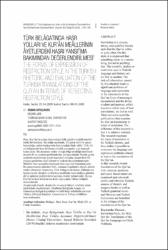| dc.contributor.author | Arpaçukuru, Osman | |
| dc.date.accessioned | 2022-05-11T14:34:35Z | |
| dc.date.available | 2022-05-11T14:34:35Z | |
| dc.date.issued | 2020 | |
| dc.identifier.issn | 1300-8498 | |
| dc.identifier.issn | 2822-2261 | |
| dc.identifier.uri | https://app.trdizin.gov.tr/makale/TXpnM05UYzVPUT09 | |
| dc.identifier.uri | https://hdl.handle.net/20.500.11776/7995 | |
| dc.description.abstract | Hasr, Kur’ân’ın çokça başvurduğu özlü, güçlü ve edebî nitelikliüstün bir üslûptur. Bu üslûp sayesinde, bir şeyin belli bir şeydebulunduğu, ondan başkasında bulunmadığı ifade edilir. Türk dilive belâgatında hasr üslûbuna yönelik çalışmalar yok denecekkadar azdır. Bu durumun neden olduğu bilgi eksikliği meâllerdeönemli dil ve anlatım problemlerine yol açmaktadır. Hasrla gelenâyetlerin meâllerinde anlam kayıpları olmakta, hasrın belli biryolunu gerektiren ilahî hikmet ve maksat da kaybolmaktadır.Meâlleri hasr açısından inceleyen bazı yayınlar bulunmaktadır.Bu araştırmanın onlardan farkı, sorunun tespitinden ziyade çözümodaklı olmasıdır. Araştırma, Türk belâgatında hasrın yollarını anahatlarıyla ele almakta ve böylece meâllerde hasrı ifadede görülendil ve anlatım problemlerini aşmaya imkân vermektedir. AyrıcaKur’ân’ın hasr üslûplarına denk veya yakın Türkçe üslûplarönermektedir.Araştırmada klasik, akademik ve sosyal tabanlı nitelikte yirmimeâl kitabı incelenmiştir. Meallerin kritiğinde Arapça veOsmanlıca belâgat kaynakları ve belli başlı tefsirlerin yanındaTürkçe dilbilgisi kitapları, Osmanlıca ve Türkçe sözlüklerebaşvurulmuştur. | en_US |
| dc.description.abstract | Restriction is a concise, strong, and qualified literary style that the Qur’an refers to quite often. On this style, it is expressed that something exists in a certain thing, but not in anything else. The scientific studies on restriction style in Turkish language and rhetoric are too few in number. The lack of information caused by this situation leads to significant problems of language and expression in the translations of the Qur’an. Loss of meaning is encountered and the divine wisdom and purpose, which require a certain way of hasr (restriction), are lost as well. There are some scientific publications that examine the Qur’an translations in terms of restriction. The difference of this research is that it is solution oriented. The research examines the ways of restriction in the Turkish rhetoric, and thus, makes it possible to overcome the language and expression problems related to hasr in the translations of the Qur’an. In this research, twenty translations of the Qur’an with classical, academic and social-based nature are examined and criticized. Arabic and Ottoman Turkish sources of rhetoric and exegesis books as well as Turkish grammar books and Ottoman and Turkish dictionaries are benefited in the critique of the translations of the Qur’an. | en_US |
| dc.language.iso | tur | en_US |
| dc.rights | info:eu-repo/semantics/openAccess | en_US |
| dc.title | Türk Belâgatında Hasr Yolları ve Kur'ân Meâllerinin Âyetlerdeki Hasrı Yansıtma Bakımından Değerlendirilmesi1 | en_US |
| dc.title.alternative | The Forms Of Expression Of Restriction Style in the Turkish Rhetoric and Evaluation Of the Turkish Translations Of the Qur'?n in Terms Of Reflecting Restriction Style | en_US |
| dc.type | article | en_US |
| dc.relation.ispartof | Diyanet İlmi Dergi | en_US |
| dc.department | Fakülteler, İlahiyat Fakültesi, Temel İslam Bilimleri Bölümü | en_US |
| dc.identifier.volume | 56 | en_US |
| dc.identifier.issue | 3 | en_US |
| dc.identifier.startpage | 1049 | en_US |
| dc.identifier.endpage | 1086 | en_US |
| dc.institutionauthor | Arpaçukuru, Osman | |
| dc.identifier.trdizinid | TXpnM05UYzVPUT09 | en_US |



















